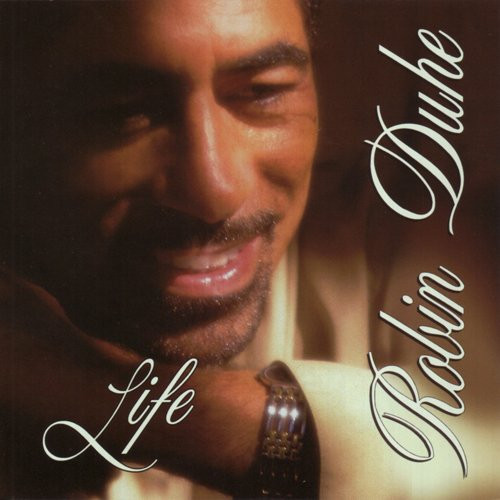Reviewed by Chris Mann
(Original Source: http://www.smooth-jazz.de/Chris/Life.htm)
If you look in your music collection and pull out a Maze album, listen to it and let the groove take you over. In the middle of that groove you’ll hear the funky and very soulful bass playing of Robin Duhe.
After three decades of recording and touring with Maze, Robin stepped out in 2004 to embark on a solo career. This is his second solo album, following ‘Do it Duhe’ and it really is a labour of love as he fell dangerously ill while recording it. The title has taken on a deep significance.
So what’s Robin’s sound like in 2009?
‘Heavy Traffic’ grabs me from the opening bars. The bass sounds are more high-tech than those 70’s and 80’s recordings but make no mistake, that groove and that soul is there. This track manages to be deeply funky, moody and incredibly catchy at the same time with some great horns and a kind of whistling effect that you’ll be copying by the end of the song. Play it loud!! You’d expect Robin’s version of Maze’s ‘Happy Feelin’s’ to capture the sunshine that was central to the original song and so it does. The bass takes the melody but delivers it gently, in the way that Frankie Beverly did. This is a gem for radio and bridges the gap between classic soul and what’s happening right now – DJ’s get hold of this please!
‘Life (Gets in the Way)’ is a smooth mid-tempo vocal song and both lead and background vocals are very classy indeed. I like the autobiographical lyrics in this song and the production is elegant enough to place them centre stage. Listen well to this song: it’s very thought-provoking. Duhe is clearly close to the R&B and contemporary jazz listener because on ‘Déjà Vu’ he delivers a groove that deserves to be played in hip clubs and on radio everywhere. High-register bass melodies and sweet sax bring fellow Californians, The Braxton Brothers, to mind.
Like your funk heavy? ‘1133 Funk-a-Donk’ certainly brings a smile to my face. If you can listen to this gut-bucket bass, clicking rhythm guitar and slightly sinister rock guitar lick and not think of Funkadelic, then your music collection is probably very different from mine. In contrast, ‘Where you Are’ unfolds like a ballad that any of America’s top soul bands would have produced in the 70’s. The instrumentation is bang up to date but the feel is heavenly retro. It makes me unashamed to use the word ‘soul’ instead of the marketing man’s term ‘R&B’. Some people didn’t forget why the music had the name it had…
Skip Scarborough’s ‘Don’t Ask my Neighbors’ receives a lovely instrumental treatment here and the lyrical side of Duhe’s playing is to the fore. Keyboards, percussion and sax complete the picture. Highly romantic.
Whoa – ‘Beginnings’ launches you straight into Stanley Clarke territory. It has a brooding synth drum track underpinning layers of bass soloing. He’s seriously stretching out here…
On ‘Say It’, the funk is light, tight and utterly addictive. The bass bounces, the snare snaps and the male vocals are very gritty. I miss the days when FM radio stations played music this good and I pray for the days when they’ll play it again. I’ve always liked the term ‘tone poem’ and for me, the gorgeous ‘Sunset’ with its swathes of percussion and fretless bass is just that. Close your eyes – it’s the only way to let this fully wash over you.
From ‘Sunset’ to ‘Tequila Sunrise’. Songs with a Latin flavour are often a nice surprise for me on contemporary jazz albums. This gently keyboard-led song shifts moods more than most Latin songs but it won’t throw you off balance and, at a full seven minutes long, it will draw you in. There are layers of bass soloing on the interlude ‘Me, Myself & I’. A clever title, now I come to think of it.
Robin Duhe makes no secret of his Christian beliefs and ‘He Will See you Through’ speaks of those. Again, the lyric is autobiographical and it’s a reminder of how he found the strength to push through and complete this recording. The lyric is spoken over a bed of bass fills and almost whispered background vocals. An instrumental version of the title track allows Duhe’s tenor bass to sing, in a way fans of the late, great Wayman Tisdale will be familiar with. There’s a deep groove underlying the deep message on ‘Put Your Guns Up’. The lyric is spoken again and though the subject is serious, I swear Duhe is smiling. This would be a great song to put a rap to. The arrangement is so sparse, there is room to go crazy with this song in a live setting.
So, this is really a landmark album for a player who’s closely associated with a band cherished by soul fans. He’s built on that sound but his technique and production have taken him beyond that into serious contemporary jazz territory – and I don’t mean ‘smooth jazz’, even though his music can be silky. The trauma that Duhe went through while making this album has made it a vehicle for praise and great optimism.
There is so much here to like, to be honest I can’t wait for the next recording.
To find out more, go to: http://www.blaisetwo.com/index.htm.

